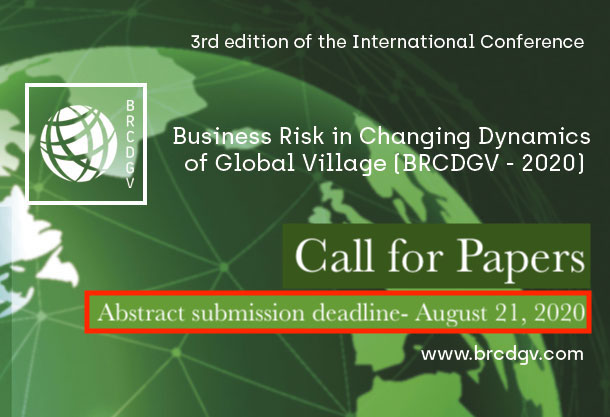The BRCDGV-2020 conference will be held ONLINE by the host – Patna University, Patna, India, in cooperation with the University of Applied Sciences in Nysa, Poland; and Ternopil Ivan Puluj National Technical University, Ternopil, Ukraine. The conference is also supported by Savitribai Phule Pune University; MIT World Peace University; “Dunarea de Jos” University of Galati; Dharmashastra National Law University; CNLU, Patna; BVDU New Law College, Pune.
We encourage professors, researchers, HR professionals, representative of companies and Doctoral/master students to submit their work to one of the streams or to the general conference stream before August 21, 2020.
To make sure that your submissions are received and reviewed, please submit as EARLY as possible.
Any question you may have please contact info@ieef.pl
Important Dates
- Deadline for abstracts: August 21, 2020
- Acceptance notification: August 27, 2020
- Last date to submit full articles: October 5, 2020
- Deadline for final version of manuscript: October 27, 2020
- Deadline for final registration for publication (printed/online): November 5, 2020
- Publication and distribution of Published text book as conference Proceeding with ISBN, as wells online ISSN: November 24, 2020
- Conference Date: November 24, 2020
How to Submit Your Abstract
All abstracts of papers and theme sessions should be submitted with your name and paper/theme session title in .pdf and .doc(x) formats directly to the conference email address at info@ieef.pl
Abstracts should be limited to 350 words of text and should include up to 5 keywords.
Please register and submit online
Please register (no payment of fees required at this stage) https://brcdgv.com/shop/ and send your paper at info@ieef.pl
Payment can be done only after acceptance of your submitted papers.
BRCDGV Conference welcomes three forms of online submissions to regular streams:
- Full papers: These are longer contributions of 8000 to 10000 words including references.
- Developmental papers: These should be approximately 3000-5000 words, including references.
- Case studies: These should be approximately 3000-5000 words, including references.
Submissions guidelines:
The papers should be formatted with 2.5cm margins, double line spacing, and Harvard referencing style (see below). You are strongly advised to proof read your paper for consistency, grammar and spelling.
Developmental and full paper requirements
Authors must supply a structured abstract set out under 5 sub-headings as below:
1. Purpose;
2. Design/methodology/approach;
3. Findings if paper is empirical;
4. Research limitations/implications;
5. Originality/value of the paper.
- There should be an abstract of less than 350 words in total.
- In addition provide up to five keywords which encapsulate the principal topics of the paper and categorise your paper.
- Notes, Footnotes or Endnotes should be used only if absolutely necessary and must be identified in the text by consecutive numbers, enclosed in square brackets and listed at the end of the article. Figures, tables and charts should be supplied within the article itself. References to other publications must be in Harvard style and carefully checked for completeness, accuracy and consistency.
Pre-Conference Publication
All articles will be subject to a double-blind peer-review process. Refereed and accepted papers will be published in collective volumes by international publishers with separate ISBN as well as ISSN online.
Distribution of Published Book
All published books/ conference proceedings will be available and distributed on November 24t, 2020, in both forms – printed as well as online.
Conference Themes
Business
Possible topics may include, but are not limited to:
- Accounting
- Business Administration
- Business Policy and Strategy
- Business Research Methods
- Electronic Commerce
- Entrepreneurship
- Financial and Banking
- Health Care Administration
- Human Resource
- International Business
- Management and Organizational Behavior
- Management Education
- Managerial Consultation
- Marketing
- Operational Management
- Non-Profit Sector Management
- Research and Development
- Social Issues in Management
Economic
Possible topics may include, but are not limited to:
- Labor Economics
- Welfare Economics
- Economic Methodology
- The Economics of Strategy
- International Economics
- Economic Development
- Household Behavior and Family Economics
- Information Economics and Management
- Business & Economics
- Economic Policy
- Law and Economics
- International Economics
- Household Behavior and Family Economics
- Measurement of Economic and Social Performance
- Prices, Business Fluctuations, and Cycles
- Public Economics
- Regional Economic Development
Finance
Possible topics may include, but are not limited to:
- Treasury and Finance
- International Finance
- Corporate Finance and Governance
- Finance & Investment
- Financial Systems Development
- Islamic Finance and Banking
- Europe’s Debt Crisis
- Asia Finance and Banking
Technology and Innovation
Possible topics may include, but are not limited to:
- Artificial Intelligence
- Big Data
- Business Intelligence
- Cloud Computing
- Data Mining
- Decision Support Systems
- Digital Business and Digital Marketing
- Digital Media
- e-Business
- FinTech
- Gamification
- Information Technology Management
- Internet and Web Applications
- Internet Computing
- Internet of Things (IoT)
- Information System and Technology
- Innovation Management
- IT and IS Innovation
- Social Media
- Social Networks
- Web Technology
Law
Possible topics may include, but are not limited to:
- International Penal Law and Criminal Justice
- Right to Life in International Law
- International Labour Law
- International Law
- Constitutional and International Law
- International Law, Human Rights and Freedom
- International Rule of Law
- Public International Law
- Conflicts of Laws and Private International La
- Comparative and International Law
- International law and Security
- Hospitality Law, International Planning and Licensing Regulations
Strategic and Change Management
Possible topics may include, but are not limited to:
- Organizational Management
- New Perspectives on Strategy Management
- Thinking and Acting Strategically
- Governance and Effective Leadership
- Strategies for Internationalization
- Mergers and Acquisitions
- Global Competition and Strategy
- Strategic Management in the Public Sector
- The Evolution of Co-Operative Strategy
- Change Management
- Business Statistics
- Strategic Thinking on Process
- The Future of Strategic Management
- Multi-national Organizations
- Implementing and Leading e-Business Change
Risk in Global Communication
Possible topics may include, but are not limited to:
- The concept of risk in language, literature, and culture
- The articulation of risk in various discourses
- Risk in translation process; managing risk in translation services
- Translation technology – risk or facilitator?
- Risk in film, theatre, television, and social media
- Risk in education process; dangers, risks, and opportunities of e-learning
- Education technology – risk or facilitator?
- Risky issues in the process of language acquisition
- Risky issues in the process of internationalisation in higher education
- Risk in travel; the concept of risk in travel writing
- Risk society and global communication











